AI PC Boom! Apple Dominates, but DeepSeek Is Reshaping the Landscape
![]() 02/28 2025
02/28 2025
![]() 545
545
DeepSeek is redefining the playing field for AI-powered PCs.
On February 26, Honor unveiled the new MagicBook Pro 14, announcing its integration with DeepSeek at the event. Prior to this, PC giants like Lenovo and ASUS also announced the incorporation or even local deployment of DeepSeek on their AI PCs.
Unsurprisingly, the concept and products of AI PCs have surged in popularity from early 2024 to the present in 2025, making it natural for them to embrace the hottest large models currently available. However, there has always been debate about how appealing AI PCs are to consumers.
Today, we can affirm that the market share of AI PCs continues to expand.
Canalys' latest report on February 25 revealed that in the fourth quarter of 2024, global shipments of AI PCs reached 15.4 million units, with a market share of 23% and a growth rate of 18%. Throughout 2024, the market share of AI PCs expanded to 17%.
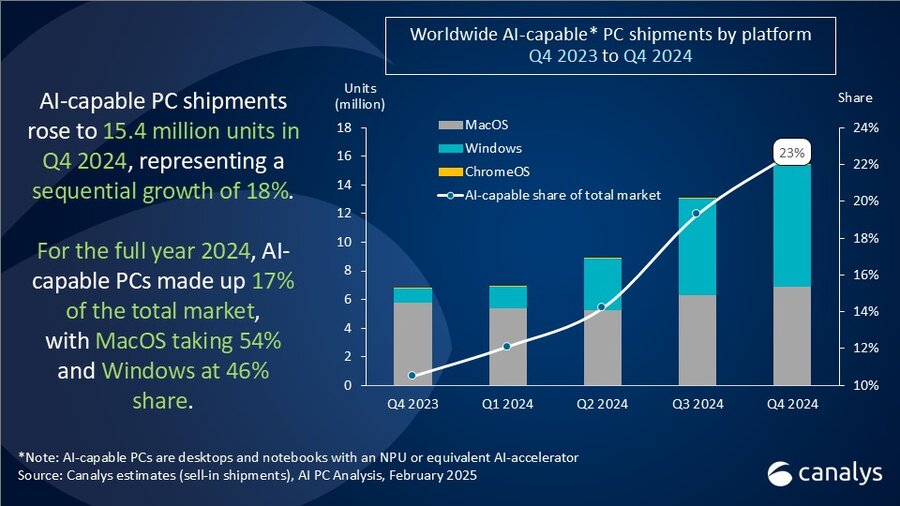
Image/ Canalys
Paradoxically, Apple remains the biggest winner in the AI PC space, accounting for 45% of the market share in the fourth quarter and 54% for the entire year.
Apple captures a quarter of the market, emerging as a significant player in AI PCs
According to Canalys' Q4 2024 global PC market report, shipments of AI PCs exceeded 15.04 million units, accounting for 23% of the global PC market. Behind these numbers lies the fact that AI PCs are gradually becoming the primary driver of market growth.
This reaffirms that AI PCs are not just a technological revolution but also a natural outcome driven by market demand. From hardware to software, AI integration is transforming the user experience, particularly for users in productivity and creativity fields where the appeal of AI PCs is evident.
Moreover, with Windows 10 set to officially end its service life, 2025 is expected to witness a fresh wave of device upgrades, especially in the domestic market where state subsidies provide additional stimulus. There are compelling reasons to believe that AI PCs will accelerate their market share expansion. However, the fundamental reason lies in the intelligent upgrades inherent in AI PCs themselves.
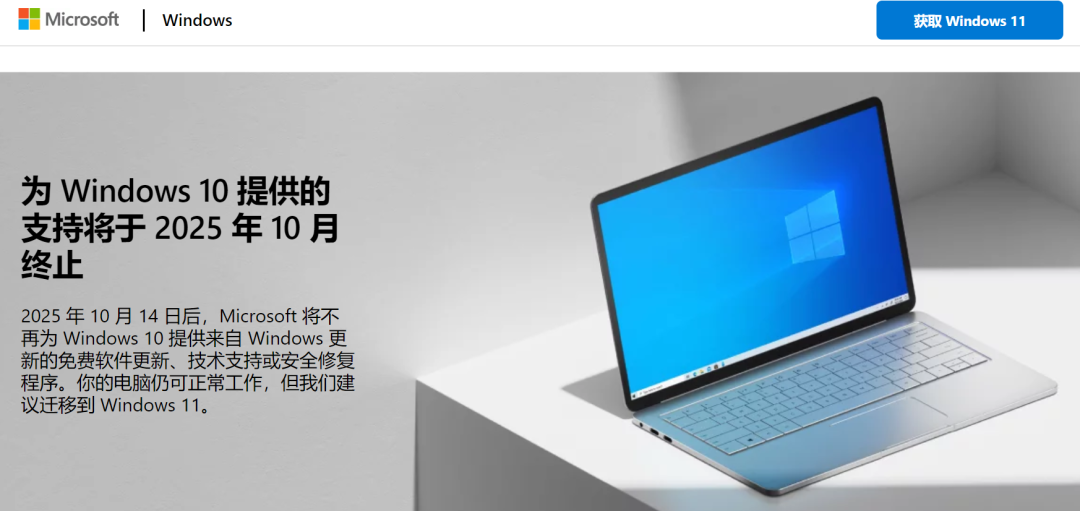
Image/ Microsoft
Notably, despite the active embrace of the AI PC wave by chip manufacturers and OEMs, Apple stands out as the biggest winner so far. According to the report, Apple leads with a 45% market share, and its share for the entire year even surpassed 54%.
This underscores Apple's dominance in the AI PC arena, thanks to the powerful performance of its M series chips and the deep optimization of macOS, making Apple's AI PC products virtually unbeatable in the market. In contrast, Lenovo, HP, and Dell, despite actively deploying AI PCs, lag far behind Apple in market share, with 15%, 14%, and 9%, respectively.
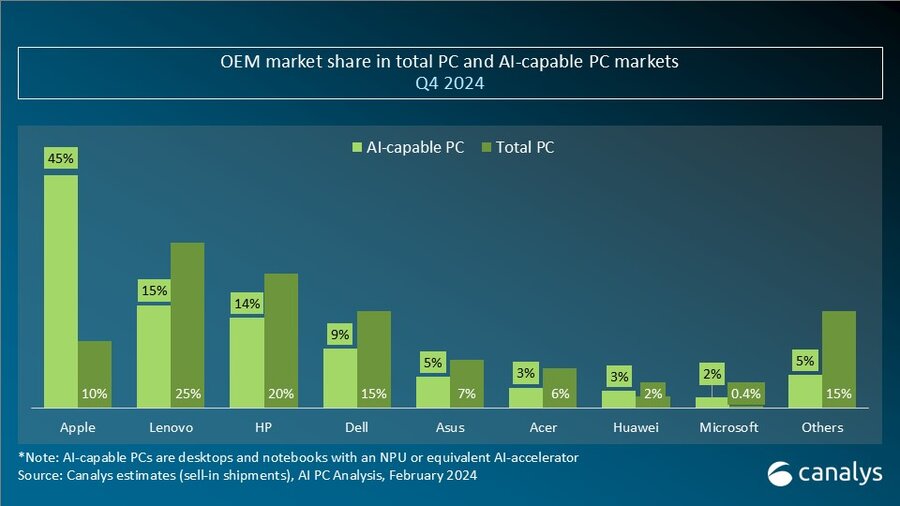
Image/ Canalys
These manufacturers have made significant attempts in hardware, but in terms of deep AI integration and ecosystem construction, they still fall short compared to Apple's leading position.
However, not only is the form and definition of AI PCs evolving, but the PC industry landscape is also in a state of constant change.
Apple's latecomer advantage stems from its M chips and vertical integration
Apple's lead in the AI PC field is primarily attributed to the ecological advantage of hardware-software integration. Despite a slow start, it quickly leveraged its strengths to deliver a superior user experience.
Since the introduction of the M series chips, Apple has ceased relying on external chip manufacturers and completely taken control of PC hardware design. The NPU (Neural Processing Unit) of the M series chips serves as the core of its AI function acceleration. Moreover, compared to AI PCs on the Windows platform, Apple's advantage extends beyond hardware to the deep optimization of macOS.
Apple's AI functions are seamlessly integrated with the system, offering users an efficient experience that fully integrates into daily use without compromising operational smoothness. Take the M4 MacBook Pro as an example; its M4 chip boasts powerful computing and image processing capabilities while further enhancing AI acceleration. Users barely notice the AI running quietly in the background, but every task becomes more efficient.
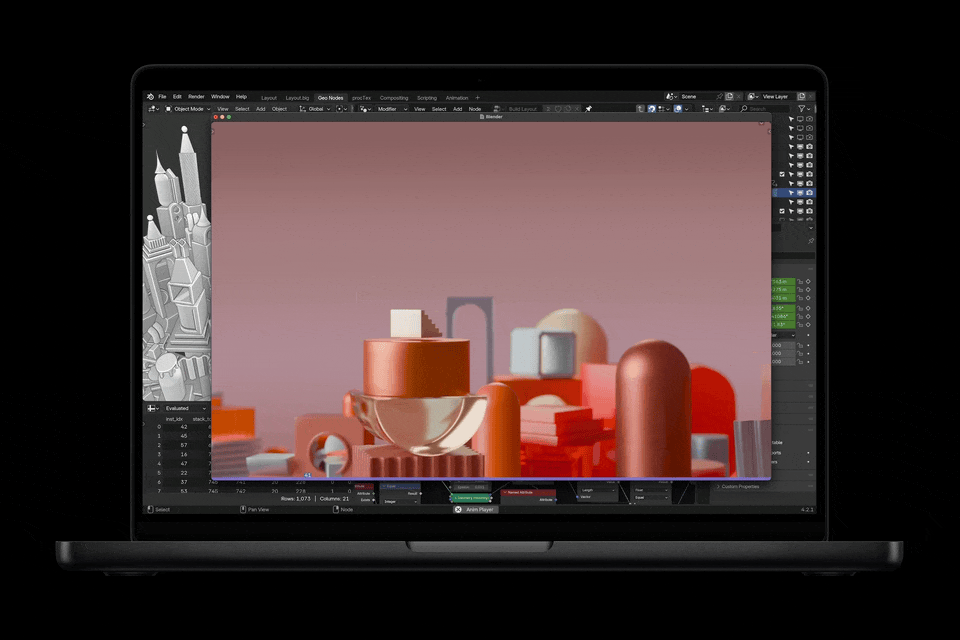
Image/ Apple
Whether it's video editing, image processing, or complex office tasks, AI provides intelligent support to users. Apple's seamless AI experience sets it apart: rather than making AI an explicit "selling point," it allows it to quietly integrate into operations as a tool to enhance work efficiency.
In contrast, the Windows PC landscape is relatively fragmented, with operating system vendors, chip manufacturers, and OEMs often not moving in unison.
Intel, AMD, and the newly emerged Qualcomm focus on enhancing AI performance and overall energy efficiency; Microsoft's core focus is reimagining the Windows system based on AI; OEMs such as Lenovo, Dell, and Honor integrate hardware and software to implement more AI capabilities.
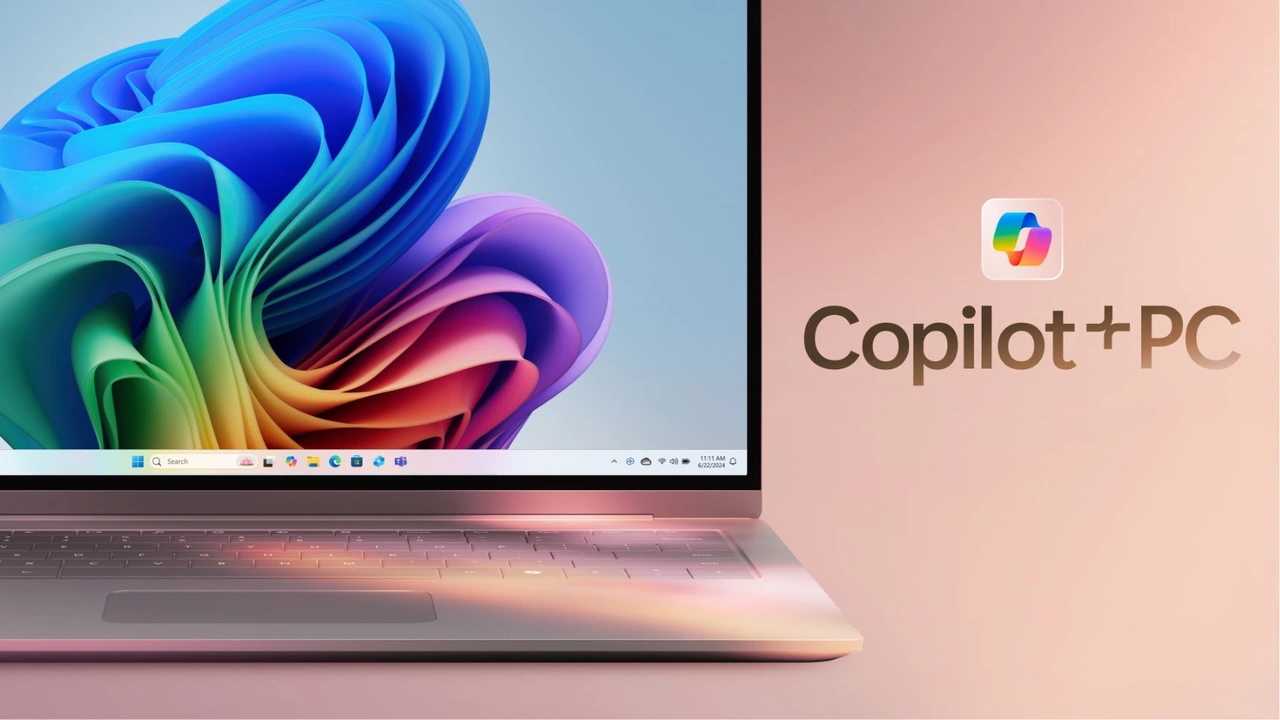
Image/ Microsoft
However, in practice, the AI integration of Windows 11 has not been ideal, and ordinary consumers barely perceive it. The scheduling of NPUs and the deployment of Copilot capabilities cannot be deemed failures, but they certainly cannot be considered successful. This has prompted OEMs to develop their own "AI," but constrained by the operating system, they can only focus on the application level, making their solutions highly replaceable.
In simple terms, although the hardware provides basic support for AI computing, Windows has not been deeply optimized for AI, and OEMs still face issues with insufficient software and hardware coordination. Therefore, even with sufficiently powerful AI acceleration capabilities on the hardware side, users often perceive AI's intervention more as "noticed" rather than "seamless".
However, this does not mean that Windows PC manufacturers lack highlights in the AI field. Lenovo's ThinkPad X1 Carbon Gen 13 Aura Edition is a case in point. It is equipped with Intel's Core Ultra 200V processor, combining powerful AI acceleration capabilities, especially in business and creative design fields, where it offers excellent multitasking and machine learning capabilities.
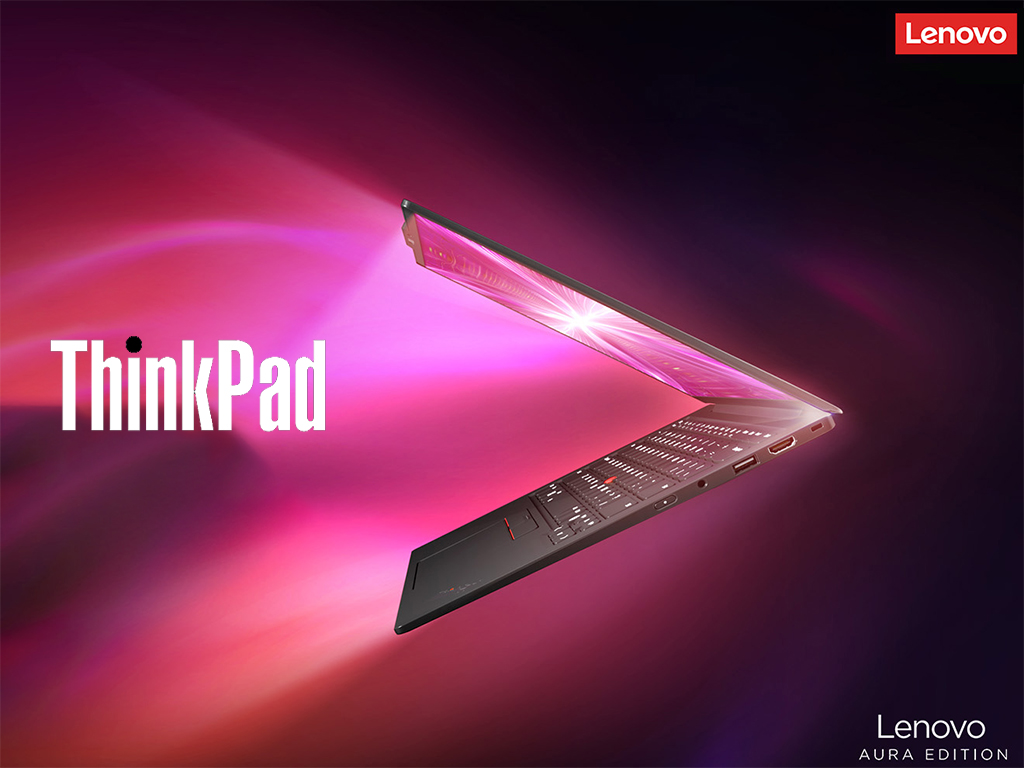
Image/ Lenovo
Although Lenovo cannot deeply integrate AI like Apple, its hardware and software combination compensates for this gap to some extent.
Currently, Apple's advantage in the AI PC field is clearly the result of deep integration of technology and ecosystem, transforming AI from an additional feature into an integral part of the user's daily experience. While vendors on the Windows platform are still in the exploratory stage, with the continuous improvement of hardware performance and the gradual deepening of AI capabilities, this situation may change in the future.
Is DeepSeek Reshaping the Game Rules of AI PCs?
Laozi said, "Misfortune lies beside good fortune, and good fortune hides behind misfortune."
While Apple benefits from its closed ecosystem and high vertical integration, allowing it to quickly surpass other PC manufacturers in terms of AI PC experience, in the stage of rapid iteration of large models, an open ecosystem is more likely to embrace leading technologies and models. DeepSeek is a prime example.
At the beginning of 2025, the DeepSeek team released lightweight versions of "DeepSeek-R1" based on Alibaba's Qwen open-source model distillation – 7B, 13B, and 35B, which can run smoothly on devices with lower computing power. Thanks to DeepSeek's open-source policy and efficient compression technology, even mid-range AI PCs can deploy and run the lightweight R1 version with strong natural language understanding capabilities.
Currently, we only see companies accessing the full-strength version of DeepSeek through cloud deployment, with the deepest integration perhaps being functions like the "AI Workspace," which allows users to bind DeepSeek-R1 with local document libraries.
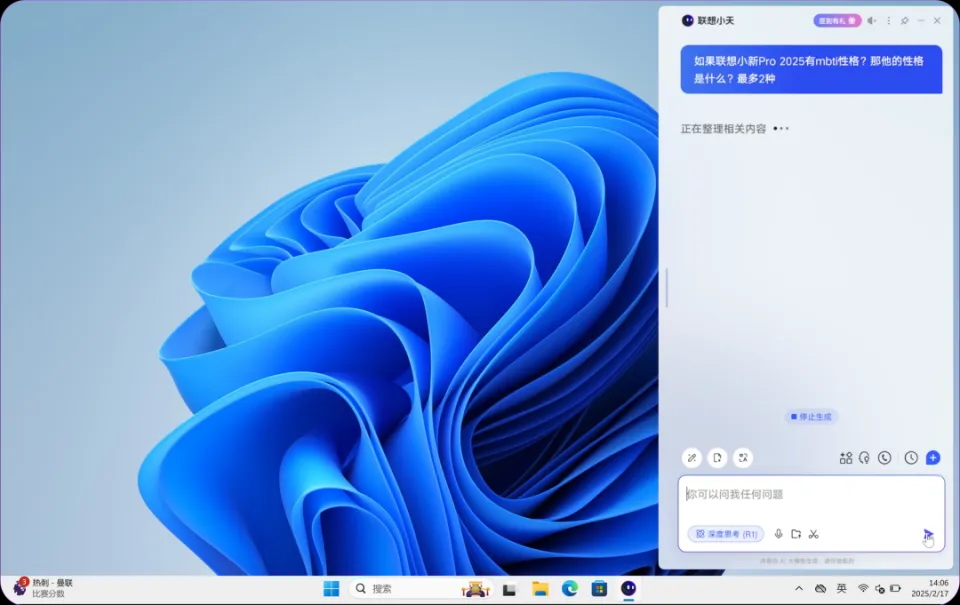
Supports DeepSeek-R1, Image/ Lenovo
However, AI PCs ultimately require local deployment for AI to understand user intentions, process sensitive data, and operate computers locally. Many manufacturers may already be attempting to deploy the lightweight R1 locally as a base model, combined with the cloud-deployed full-strength R1, to achieve a superior AI PC experience.
Meanwhile, while Apple still leads with a 54% market share, and the NPU performance of the M series chips is robust, macOS imposes strict restrictions on access to large models at the system level, and developers must rely on Apple's proprietary Core ML framework.
In a sense, this is a "flanking maneuver" by the Windows camp against Apple's ecological barriers – if Apple's dominance stems from the closed integration of hardware and software, then DeepSeek's openness and customizability provide PC manufacturers with a differentiated path to breakthrough.
The variable introduced by DeepSeek is essentially a battle for dominance in the AI PC ecosystem, marking the entry of AI PC competition into deeper waters. However, regardless of the outcome, the key to future success may not lie in who can create more powerful chips but in who can truly transform AI into a personalized productivity tool for everyone.
When everyone can train a personalized "digital assistant" locally, the imagination of AI PCs may truly begin to soar.
Source: Leitech








